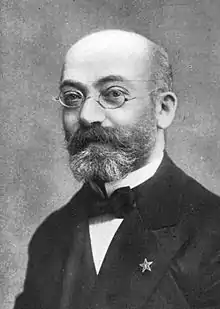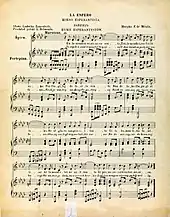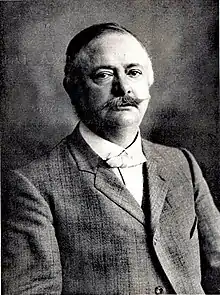La Espero
"La Espero" (English: "The Hope") is a poem written by Polish-Jewish doctor L. L. Zamenhof (1859–1917), the initiator of the Esperanto language. The song is often used as the (unofficial) anthem of Esperanto, and is now usually sung to a triumphal march composed by Félicien Menu de Ménil in 1909 (although there is an earlier, less martial tune created in 1891 by Claes Adelsköld, along with a number of other lesser-known tunes). It is sometimes referred to as the hymn of the Esperanto movement.
| English: The Hope | |
|---|---|
 L. L. Zamenhof, the author of La Espero. | |
anthem of | |
| Lyrics | L. L. Zamenhof |
| Music | Félicien Menu de Ménil |
| Adopted | 1891 |
| Audio sample | |
Instrumental recording
| |
| Part of a series on |
Esperanto flag |
|---|

Some Esperantists object to the use of terms like "hymn" or "anthem" for La Espero, arguing that these terms have religious and nationalist overtones, respectively.[1]
Lyrics
| La Espero | The Hope |
|---|---|
En la mondon venis nova sento, |
Into the world came a new feeling, |
See also
References
- Arpad Ratkai (April 1992). "La himno kaj la dua jarcento". Retrieved 1 December 2014.
External links
 Media related to La Espero at Wikimedia Commons
Media related to La Espero at Wikimedia Commons- "La Espero" sung by Aiko Asano ft. Andrej Korobejnikov on YouTube
- A capella version by Akordo on YouTube
- Instrumental version on YouTube
- Instrumental version, march on YouTube
